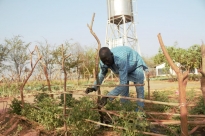
More than 40% of youths in The Gambia remain unemployed.
Of those that are employed, a significant number are working under challenging conditions with low wages that may not guarantee sustainable livelihoods and a prosperous future.
These, amongst other factors may contribute to higher rates of youths migration within the country (from rural to urban areas) as well as irregular emigration.
Youth unemployment may negatively impact food and nutrition security, poverty eradication and overall sustainable national development efforts in The Gambia.
The Gambian Government and its international development partners including the United Nations (UN) are committed to addressing these challenges by 2030 under the Sustainable Development Goal 8, that is “Promote sustained, inclusive and sustainable economic growth, full and productive employment and decent work for all”.
This is elaborated in the Gambia’s National Development Plan, the United Nations Development Assistant Framework of The Gambia , as well as the African Union Malabo Declaration on Accelerated Agricultural Growth and Transformation for Shared Prosperity and Improved Livelihoods.
The latter commits Member States to create job opportunities for at least 30% of youth in agricultural value chains.
FAO, a specialized Agency of the UN leads international efforts to defeat hunger; through the FAO-Gambia Country Programming Framework.
The Government of The Gambia has identified the Agriculture and Natural Resources Sectors as key priority areas for investment to stimulate economic growth and sustainable development.
Economic growth may depend on effective and efficient youth engagement in agricultural inclusive food systems.
FAO-Gambia’s Country Programming Framework is highly dependent on the European Union (EU)’s support.
Through the EU funded project ’Agriculture for Economic Growth’, FAO has successfully recruited a team of 26 youths who graduated from the Gambia Songhai Initiative (GSI) to serve as Crop Production Assistants in 13 Community Gardens in the North Bank, Lower River, Central River and Upper River Regions of the Gambia.
The 4 Regions have notable levels of food insecurity and youth migration. Twelve of the host communities are beneficiaries of EU funded Gardens whilst the Global Environment Facility (GEF) Project supports one community.
These vegetable gardens are equipped with solar-powered irrigation systems and post-harvest infrastructure. FAO is facilitating the construction of ten feeder roads of 40km to these communities to ease access to markets through the EU “Agriculture for Economic Growth” Project.
The engagement of the 26 youths builds on the partnership with the Ministry of Agriculture to strengthen the capacities and resilience of rural communities.
It is a continuation of past practices such as the recruitment of 16 graduates posted to 8 Community Gardens through the MDG1c Project in 2016.
Furthermore, over 500 Farmer Field School Facilitators and 50 Agro-Pastoral Field School Facilitators established through EU funding are to date trained in good agricultural practices including climate smart agriculture and the use of smartphones for effective extension services delivery.
The 26 graduates will receive smart phones and guidance to provide live data on commodities.
Commenting on the initiative, Ms. Moshibudi Rampedi, FAO Country Representative said, ‘FAO values youth and women empowerment.
As we accelerate actions towards the implementation of the UN Decade of Action (2020-2030) and building back better noting the impact of the COVID-10 pandemic; FAO strives to make agriculture attractive to the youths; their effective participation in the agri-food systems is critical, they are the future.
FAO is grateful for the strategic funding from the EU and GEF Youth engagement in the agricultural value chains supports Gambia’s national development priorities’.
Source- Gambia Youth news





